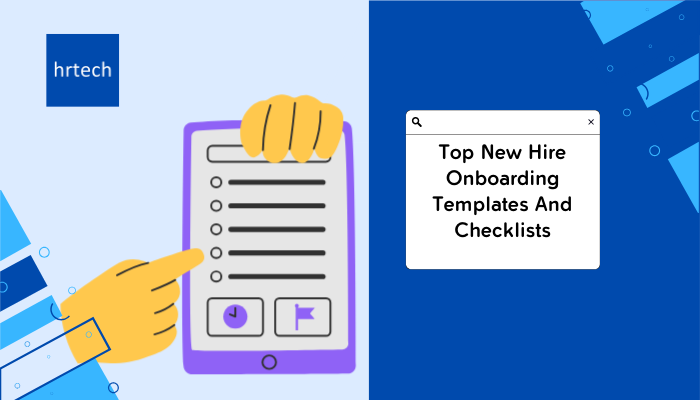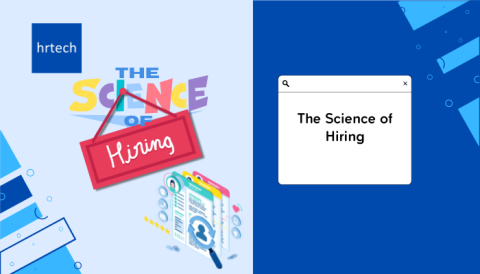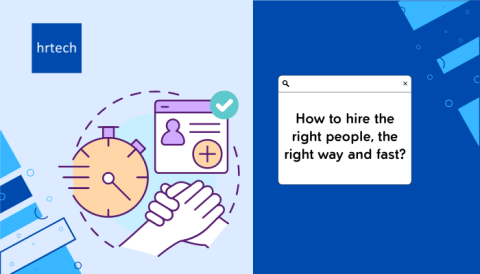Ready to simplify your onboarding process and improve new hire onboarding experience? One of the best ways to do that is by implementing a well-structured onboarding template and checklist.
In this guide, we’ll share with you the top 12 free new hire onboarding templates and checklist. Whether you’re looking for a general onboarding template or a specific onboarding template related to the sales team or a technical role, we’ve covered all options.
So let’s get started!
Top 12 New Hire Onboarding Template And Checklist
1. General New Hire Onboarding Template
The new hire general onboarding template covers all the standard steps that’s suitable for most roles. It involves essential elements like company orientation, IT setup, benefits, and more.
Pro-Tip: If you’re new to hiring employees we highly recommend checking out this complete guide to onboarding new hires in 5 simple steps, along with a checklist.
2. Executive Onboarding Template
| Phase: | Activities: |
| Before First Day | Complete executive-level HR paperwork and agreements |
| Review company strategy, financials, and board materials | |
| Assign executive coach or mentor | |
| Day 1 | Meet with CEO and executive team |
| Introduction to board members and key stakeholders | |
| Overview of company vision, mission, and strategic priorities | |
| Week 1 | One-on-one meetings with direct reports and key stakeholders |
| Review current projects, initiatives, and challenges | |
| Attend executive team meetings and strategy sessions | |
| Week 2-4 | Develop 30-60-90 day plan with CEO and executive coach |
| Participate in leadership development and coaching sessions | |
| Begin implementing strategic initiatives and projects | |
| Month 2-3 | Present progress and insights to board of directors |
| Continue leadership development and team building Activities: | |
| Gather feedback from CEO, executive team, and board |
When onboarding senior-level hires, use this template to focus on strategic goals, leadership introductions, and aligning with the company vision.
3. Remote Employee Onboarding Template
Designed specifically for new hires who will be working remotely, this template covers remote work policies, virtual team introductions, and remote communication tools.
4. Marketing Team Onboarding Template
| Phase: | Activities: |
| Before First Day | Complete HR paperwork and marketing-specific agreements |
| Review company brand guidelines and marketing strategies | |
| Assign marketing mentor or buddy | |
| Day 1 | Orientation to company mission, values, and culture |
| Meet with marketing team members and key stakeholders | |
| Overview of marketing goals, initiatives, and performance metrics | |
| Week 1 | In-depth training on marketing tools, software, and processes |
| Shadow experienced team members in various marketing roles | |
| Learn about target audience, buyer personas, and customer journey | |
| Week 2-4 | Collaborate on ongoing marketing campaigns and projects |
| Attend marketing team meetings and brainstorming sessions | |
| Receive feedback and coaching from manager and mentor | |
| Month 2-3 | Take ownership of specific marketing tasks or initiatives |
| Participate in marketing skills development and training | |
| Set performance goals and development plans with manager |
This template is designed for marketing roles and includes branding guidelines, marketing strategies, and an overview of campaign tools.
5. Temporary Staff Onboarding Template
| Phase: | Activities: |
| Before First Day | Complete temporary staff paperwork and agreements |
| Provide info on job duties, schedule, and expectations | |
| Assign temporary staff supervisor or point of contact | |
| Day 1 | Orientation to company policies and procedures |
| Introduction to team members and work area | |
| Overview of job tasks, priorities, and performance expectations | |
| Week 1 | On-the-job training for specific tasks and responsibilities |
| Regular check-ins with supervisor to answer questions and provide guidance | |
| Attend relevant team meetings and training sessions | |
| Week 2-4 | Continue performing job duties with increasing autonomy |
| Receive feedback and coaching from supervisor | |
| Participate in team events and recognition programs | |
| Month 2-3 | Evaluate temporary staff performance and fit for the role |
| Provide feedback and recommendations for improvement | |
| Discuss potential for extension or permanent employment |
This template is helpful when you’re onboarding temporary staff or contractors. It includes short-term goals, company policies, task-specific training, and more.
6. Sales Employee Onboarding Template
This template is customized for sales roles and includes product training, sales processes, and CRM tool setup.
7. Intern Onboarding Template
| Phase: | Activities: |
| Before First Day | Complete intern paperwork and agreements |
| Assign intern mentor or buddy | |
| Provide info on dress code, parking, and other logistics | |
| Day 1 | Orientation to company mission, values, and culture |
| Introduction to intern program and expectations | |
| Office tour and setup of intern workspace | |
| Week 1 | Overview of department goals and intern projects |
| Training on relevant tools, software, and processes | |
| Attend team meetings and shadow experienced team members | |
| Week 2-4 | Regular check-ins with mentor and manager |
| Work on assigned projects and tasks | |
| Participate in intern-specific events and networking opportunities | |
| Month 2-3 | Present project progress and insights to team |
| Gather feedback on intern experience and performance | |
| Discuss future career opportunities and next steps |
Help your interns with this template that focuses on learning objectives, mentorship programs, and short-term project assignments.
8. Technical Role Onboarding Template
| Phase: | Activities: |
| Before First Day | Complete HR paperwork and background checks |
| Set up development environment and access to systems | |
| Assign technical mentor or buddy | |
| Day 1 | Orientation to company mission, values, and culture |
| Introduction to technical team members and key stakeholders | |
| Overview of technical stack, architecture, and development processes | |
| Week 1 | In-depth training on technical tools, frameworks, and methodologies |
| Pair programming and shadowing with experienced team members | |
| Review coding standards, best practices, and documentation | |
| Week 2-4 | Participate in agile ceremonies (like stand-ups, sprint planning) |
| Collaborate on code reviews and technical design discussions | |
| Contribute to ongoing projects and bug fixes | |
| Month 2-3 | Take ownership of small to medium-sized projects |
| Participate in technical mentorship and knowledge sharing | |
| Set performance goals and development plans with manager |
For IT, engineering, developer, and other technical positions, this template covers system setups, software tools, and access to technical documentation.
9. Customer Support New Hire Onboarding Template
| Phase: | Activities: |
| Before First Day | Complete HR paperwork |
| Review company’s customer service philosophy | |
| Familiarize with product/service offerings | |
| Day 1 | Orientation to company mission and values |
| Introduction to customer support team and key stakeholders | |
| Overview of customer support tools and systems | |
| Week 1 | In-depth training on product/service knowledge |
| Shadowing experienced customer support representatives | |
| Practice handling mock customer inquiries | |
| Review customer interaction guidelines and best practices | |
| Week 2-4 | Continued on-the-job training and shadowing |
| Regular feedback and coaching sessions with manager | |
| Gradually increase responsibility for handling customer inquiries | |
| Attend communication skills and conflict resolution training | |
| Month 2-3 | Transition to full autonomy in handling customer inquiries |
| Ongoing product/service updates and training | |
| Participation in team meetings and quality assurance reviews | |
| Set performance goals and development plans with manager |
Focused on customer service roles, this template emphasizes customer interaction guidelines, support systems, and communication skills training.
10. Healthcare Onboarding Template
| Phase: | Activities: |
| Before First Day | Complete healthcare-specific paperwork, certifications, and trainings |
| Review patient care protocols and medical equipment usage | |
| Assign healthcare mentor or preceptor | |
| Day 1 | Orientation to healthcare facility mission, values, and culture |
| Introduction to healthcare team members and key departments | |
| Overview of patient care standards and procedures | |
| Week 1 | Hands-on training with medical equipment and patient care techniques |
| Shadow experienced healthcare professionals in various roles | |
| Learn proper documentation and charting procedures | |
| Week 2-4 | Gradually assume patient care responsibilities under supervision |
| Attend healthcare team meetings and case discussions | |
| Receive feedback and coaching from preceptor and manager | |
| Month 2-3 | Demonstrate proficiency in patient care and documentation |
| Participate in continuing education and professional development | |
| Set performance goals and development plans with manager |
This template is suitable for healthcare employee onboarding. It covers important elements like patient care guidelines, medical protocols, and compliance training.
11. Finance Onboarding Template
| Phase: | Activities: |
| Before First Day | Complete HR paperwork and finance-specific agreements |
| Review company financial policies, procedures, and systems | |
| Assign finance mentor or buddy | |
| Day 1 | Orientation to company mission, values, and culture |
| Introduction to finance team members and key stakeholders | |
| Overview of financial goals, metrics, and reporting processes | |
| Week 1 | In-depth training on financial systems, software, and tools |
| Shadow experienced finance team members in various roles | |
| Learn company-specific financial processes and best practices | |
| Week 2-4 | Participate in financial reporting and analysis projects |
| Attend finance team meetings and cross-functional collaborations | |
| Receive feedback and coaching from manager and mentor | |
| Month 2-3 | Take ownership of specific financial tasks or responsibilities |
| Develop and implement process improvements for financial efficiency | |
| Set performance goals and development plans with finance manager |
When hiring finance and accounting professionals, this template is helpful to highlight financial systems, compliance regulations, and reporting processes.
12. HR Department Onboarding Template
| Phase: | Activities: |
| Before First Day | Complete HR-specific paperwork and trainings |
| Review employee handbook and HR policies | |
| Assign HR mentor or buddy | |
| Day 1 | Orientation to company mission, values, and culture |
| Introduction to HR team members and key stakeholders | |
| Overview of HR systems, processes, and employee lifecycle | |
| Week 1 | In-depth training on HR policies, compliance, and best practices |
| Shadowing HR team members in various roles and responsibilities | |
| Learn employee onboarding and offboarding processes | |
| Week 2-4 | Participate in HR projects and initiatives |
| Attend HR-related meetings and training sessions | |
| Begin handling employee inquiries and requests | |
| Month 2-3 | Take on increasing responsibility for HR functions |
| Develop and implement HR process improvements | |
| Set performance goals and development plans with HR manager |
This template covers all essential elements that’s necessary in the process of onboarding HR professionals. It covers company policies, recruitment processes, and employee relations best practices.
Want to simplify your onboarding process? Explore the 10 best employee onboarding software solutions.
What Is New Hire Onboarding?
Onboarding is the process of integrating a new employee into an organization, familiarizing them with the company culture, policies, and their specific role.
A complete onboarding process typically starts from the moment an offer is accepted and extends through the first few months of employment.
Key elements of a successful onboarding process include:
- Orientation – Introducing the new hire to the company’s mission, values, and policies.
- Role-specific training – Providing the necessary training and resources for the new employee to perform their job effectively.
- Team introductions – Helping the new hire build relationships with their colleagues and understand team dynamics.
- Goal setting – Establishing clear expectations and objectives for the new employee’s role.
- Ongoing support – Providing regular check-ins, feedback, and mentorship to ensure the new hire’s success.
Despite the importance of onboarding, many companies face challenges in creating and implementing an effective process.
Common issues include lack of structure, inconsistency across departments, and inadequate time allocated for onboarding. This is where templates and checklists come in handy.
Why Use New Hire Onboarding Templates And Checklists?
Using templates and checklists for your onboarding process offers several key benefits as follows:
- Time-saving – With a pre-designed template, you don’t have to start from scratch each time you onboard a new employee. This saves valuable time for HR and managers.
- Consistency – Templates ensure that all new hires receive the same information and undergo similar experiences, regardless of their role or department. This helps create a cohesive company culture and avoids gaps in the onboarding process.
- Completeness – Checklists help you keep track of all the essential steps, from paperwork to training, ensuring nothing falls through the cracks.
- Improved retention and engagement – A structured onboarding process helps new hires feel supported, valued, and well-equipped to succeed in their roles. This leads to higher job satisfaction, engagement, and ultimately, better retention rates.
Best Practices For Implementing Onboarding Templates
To make the most of your onboarding templates and checklists, follow these best practices:
- Assign responsibilities – Clearly define who is responsible for each step of the onboarding process, whether it’s HR, the hiring manager, or a buddy or mentor.
- Set realistic timelines – Ensure that your onboarding timeline is achievable and allows enough time for each step to be completed thoroughly.
- Review and update regularly – As your company evolves, so should your onboarding process. Regularly review and update your templates to reflect any changes in policies, tools, or best practices.
- Gather feedback – Get feedback from new hires and managers to continuously improve your onboarding process. Use surveys, interviews, or focus groups to gain insights and identify areas for improvement.
How To Measure Effectiveness Of The Onboarding Process?
To ensure your onboarding process is effective, it’s crucial to measure its success. Here are some key performance indicators (KPIs) to track:
- Time to productivity – How long does it take for new hires to reach full productivity in their roles?
- Retention rates – What percentage of new hires stay with the company after 90 days, 6 months, or 1 year?
- Employee engagement – How engaged and satisfied are new hires with their jobs and the company overall?
- Manager satisfaction – Do managers feel that new hires are well-prepared and contributing to the team’s success?
As you regularly track these KPIs and gather feedback, you can identify areas for improvement and make data-driven decisions to improve your onboarding process.
FAQs:
How To Create An Onboarding Plan For A New Hire?
To create an onboarding plan for a new hire, follow these steps:
- Define the onboarding timeline and goals.
- Identify key stakeholders and assign responsibilities.
- Create a checklist of tasks and activities for each phase of onboarding (e.g., pre-arrival, first day, first week, first month).
- Customize the plan based on the new hire’s role, experience, and needs.
- Include a mix of orientation, training, socialization, and feedback activities.
- Implement the plan and track progress.
- Gather feedback and iterate on the plan as needed.
What Are The 5 C’s Of New Hire Onboarding?
The 5 C’s of new hire onboarding is a framework that helps organizations create a complete and effective onboarding process. The framework includes:
- Compliance – Ensuring that new hires complete all necessary paperwork and understand company policies and legal requirements.
- Clarification – Clearly defining job roles, expectations, and performance goals.
- Connection – Helping new hires build relationships with colleagues and feel part of the team.
- Culture – Introducing new hires to the company’s values, norms, and traditions.
- Check-ins – Providing regular feedback, support, and guidance throughout the onboarding process.
What Is Included In The New Hire Onboarding Process?
New hire onboarding typically includes the following elements:
- Prior to arrival tasks (like completing paperwork, setting up accounts)
- Orientation to company mission, values, and policies
- Introduction to team members and key stakeholders
- Job-specific training and shadowing
- Goal setting and performance expectations
- Regular check-ins and feedback sessions
- Social activities and team-building events
- Ongoing support and development opportunities
What To Include In An Onboarding Document?
An onboarding document, such as a template or checklist, should include:
- Before to joining tasks and requirements
- First day, week, and month schedules and activities
- Key contacts and company resources
- Company policies and procedures
- Job-specific training and goals
- IT and administrative setup tasks
Final Thoughts
A strong onboarding process is essential for setting new hires up for success and creating a positive employee experience.
We hope you’ve got lots of ideas and inspirations from the top 12 new hire onboarding templates and checklists we’ve shared in this guide. Remember to create your onboarding templates to fit your company’s unique needs and best practices.
Looking to grow fast in your HR career? Check out industry-leading HR training programs and courses at hrtech. Don’t miss our special discounts on some of the top HR training programs. Explore now to learn more!





